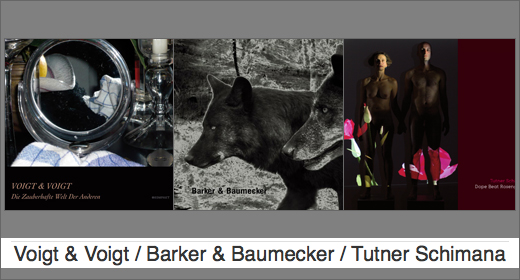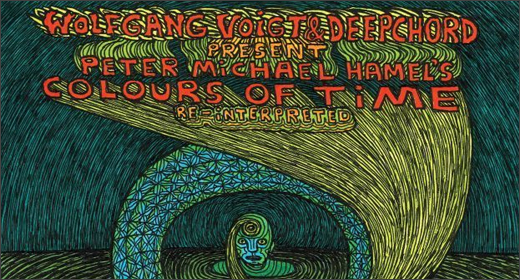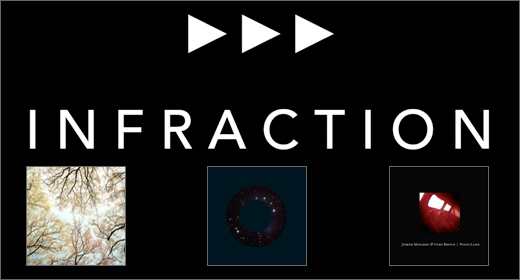Brothers, buddies and bipartites in beats. A trio of avant techno duos innocent and experienced, cerebral and hedonistic.
Voigt & Voigt :: Die Zauberhafte Welt Der Anderen (Kompakt)
Probably the most talked-about siblings in electronic music circles so far this century, it seems astonishing that Die Zauberhafte Welt Der Anderen is the first full-length Wolfgang and Reinhard Voigt have released together. Despite a hefty, dancier catalogue as Mike Ink and several dozen other pseudonyms, Wolfgang is primarily held in the highest regard for his quartet of albums as Gas, the epochal marriage of the most straightforward beat in history and cloudy, grainy ambient. Though less prolific (Wolfgang is also an accomplished visual artist), Reinhard has been instrumental in the unprecedented success and influence of the Kompakt label the two co-founded with Michael Meyer and Jürgen Paape, and his contributions to its “DJ friendly” Kompakt Extrasub label are standouts. The brothers recorded this album at the outset of Kompakt´’s 20th anniversary year, simultaneously with Erdingertrax, a series of wily techno singles.
Despite its crisp, mathematical repetitiveness, there is fuzzy logic at work. Its pluriformity, like its cover photo, might be perplexing, but makes its own kind of (non)sense. Die Zauberhafte Welt Der Anderen is audio film noir, samples creepy, recurring narration and even features a car chase midway through. It has some jazz to it, angly with a hint of no wave, another time smooth and flutey. When it dances, it dances light-footed on darkened, industry park loading docks while everything is being surreptitiously recorded by security cameras. The brothers´ beats are always juicy and attractive, but the woody vibes of “Der Erste Zug” and analogue blobs of “Der Keil NRW” propel techno to warm new places. “Triptychon Nummer 7” is a deadpan parody of the kind of electronic pop that stares at us from the television set with dead eyes until changing tack and growing into more formidable listening that eventually deposits us at the end station of “Der Letzte Zug.” The album proper is oddly appended with a reprise of the brief, quasi-Eastern “Akira,” sarods or sitars or sarangis strummed or bowed in a sharply-pitched, cyclic drone that now stretches nearly half an hour. Perhaps “Akira Mantra” is a cooling down exercise after the feverish brain gymnastics that precede it.
:: :: :: ::
Barker & Baumecker :: Transsektoral (Ostgut Ton)
Sam Baker & Andreas Baumecker are not genre-defiant as Voigt & Voigt but determined to transcend the mundane within the existing techno infrastructure. Solo artists of repute with steady jobs at the Berghain club in Berlin, Transsektoral merges their skills for the first time with the ambition of “traveling across the entire spectrum of electronic music.” The mild summer air of “Sektor” is a welcoming host, ushering you into the light terpsichory of “Trafo.” As the duo melt, liquify and stretch the bass, “Schlang Bang” rolls out oil drums to beat on, ramping up the rhythm, which by the time it is reduced to liquid, is simmering nicely on “Tranq.” The mind-body problem is explored by fragmenting the diva´s “no” and “body,” disembodying “No Body” before reconstructing it with all synapses firing in sync with the synthesizer smart drink of “Trans_it.” And on it raves until the morning uplift of “Spur.” A virtuoso performance, maybe a bit bloodless, but expertly paced and entertaining.
:: :: :: ::
Tutner Schimana :: Dope Beat Rosengarten (Chmafu Nocords)
Posing like a mannequin John and Yoko on their Two Virgins cover but in lurid colour and draped in petals and shadow, Elisabeth Schimana and Gernot Tutner met in 2009 while performing separately as Digital Rose Garden (Schimana) and Heavy Dope Beats (Tutner). The sexiest of the three albums, Dope Beat Rosengarten is Kraftwerkian cabaret, played at a tempo the duo characterizes as “unusually slow for techno.” Stark, powerful beats above leather-thick bass, Tutner and Schimana make meat red, minimalist music without melody, scrolled out as one track in four parts with three transitions, according to the liner notes, during one of which Schimana whispers the names of roses. No mind-body problem here as their slow but smart beats and bass hit the torso square and hard.
:: :: :: ::



















![Squaric :: 808 [Remixes] (Diffuse Reality) — [concise]](https://igloomag.com/wp/wp-content/uploads/2025/04/squaric-808-remixes_feat-75x75.jpg)






